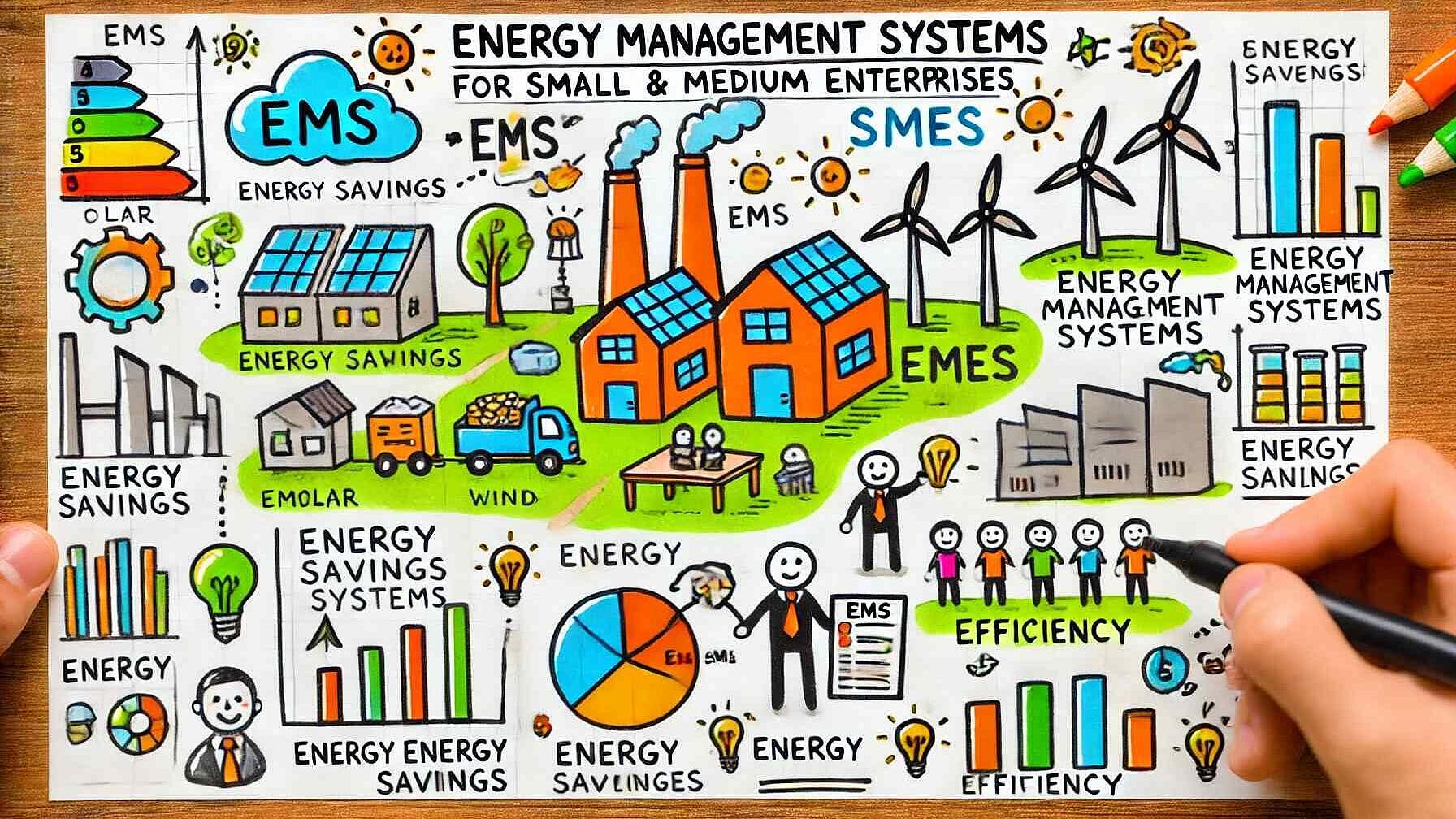 Energy Efficiency
Energy EfficiencyEnergy Efficiency Or How SMEs Can Revolutionize Their Bottom Line
Summary
Small and medium-sized enterprises (SMEs) can achieve substantial energy savings, with studies indicating potential annual reductions of 10-30% by implementing comprehensive energy management systems (EMS). However, a 2021 survey found only 16% of SMEs utilize an EMS, with barriers such as perceived costs, resource constraints, bureaucracy concerns, and lack of management commitment hindering adoption. Energy management offers strategic benefits such as decreased costs, enhanced productivity, improved compliance with environmental regulations, and a boosted reputation.
Technological advances, including smart meters and IoT sensors, now enable real-time energy monitoring and optimized processes, making sophisticated energy management feasible for SMEs without large teams. Best practices for adopting an EMS include conducting energy audits, setting achievable goals, engaging all employees in initiatives, and regularly reviewing data to refine strategies. SMEs are integral to the clean energy transition, contributing to carbon emission reductions and stimulating innovation.
The European Commission acknowledges SMEs' role in recovery and sustainable progress, highlighting the importance of providing them with necessary support. Future trends in energy management for SMEs include increased use of renewables, energy storage, energy-as-a-service models, artificial intelligence, and adherence to circular economy concepts. Effective energy management practices can lead SMEs to greater financial, operational, and environmental prosperity, positioning them ahead in a more energy-conscious business landscape.
Open full article
Energy Efficiency Or How SMEs Can Revolutionize Their Bottom Line
The Hidden Potential in SME Energy Management
Small and medium-sized enterprises (SMEs) are the backbone of many economies worldwide. Yet, when it comes to energy management, these vital businesses often overlook a significant opportunity for cost savings and improved efficiency. Recent studies show that SMEs could be missing out on 10-30% potential annual energy savings by not adopting a comprehensive energy management approach.
Energy audits, while beneficial, often fail to capture the full spectrum of energy-saving opportunities. Much like radiologists who might miss a missing clavicle in a routine chest X-ray, energy auditors can overlook crucial areas for improvement. This oversight isn't due to incompetence, but rather to the complex nature of energy consumption in business operations.
The Business Case for Energy Management
Implementing an energy management system (EMS) goes far beyond simple cost savings. It's a strategic move that can enhance a company's competitive edge, improve operational efficiency, and contribute to sustainability goals. Here's why SMEs should consider adopting an EMS:
- Cost Reduction: By systematically tracking and optimizing energy use, businesses can significantly lower their energy bills.
- Improved Productivity: Energy-efficient equipment and processes often lead to increased output and reduced downtime.
- Environmental Compliance: An EMS helps businesses stay ahead of increasingly stringent environmental regulations.
- Enhanced Reputation: Demonstrating commitment to energy efficiency can improve brand image and attract environmentally conscious customers and investors.
Overcoming Barriers to Implementation
Despite the clear benefits, many SMEs hesitate to implement energy management systems. A 2021 survey revealed that only 16% of SMEs have some form of EMS in place. The main barriers include:
- Perceived high costs and long payback periods
- Resource constraints
- Concerns about bureaucracy
- Lack of strategic focus on energy management
- Information gaps
- Limited management commitment
Understanding these barriers is the first step in overcoming them. It's crucial for SMEs to realize that many of these perceived obstacles can be addressed through proper planning, education, and support from energy management experts.
The Role of Technology in Modern Energy Management
Advancements in technology have made energy management more accessible and effective than ever before. Smart meters, IoT sensors, and energy management software provide real-time data and insights that were previously unavailable to SMEs. These tools allow businesses to:
- Monitor energy consumption patterns
- Identify inefficiencies and anomalies
- Automate energy-saving processes
- Generate detailed reports for decision-making
By leveraging these technologies, SMEs can implement sophisticated energy management strategies without the need for a large, dedicated energy team.
Best Practices for Implementing an EMS in SMEs
Implementing an effective energy management system doesn't have to be overwhelming. Here are some best practices for SMEs. Not new but always important to mention:
- Start with an energy audit to establish a baseline
- Set clear, achievable energy reduction goals
- Involve employees at all levels in energy-saving initiatives
- Invest in energy-efficient equipment and technologies
- Regularly monitor and analyze energy consumption data
- Continuously improve and adjust your energy management strategy
Remember, energy management is an ongoing process, not a one-time project. The key is to start small and gradually expand your efforts as you see results.
The Broader Impact: SMEs and the Clean Energy Transition
SMEs play a crucial role in the global transition to clean energy. By improving their energy efficiency, these businesses collectively contribute to significant reductions in carbon emissions. Moreover, as SMEs adopt energy management practices, they often become catalysts for innovation in energy-efficient technologies and processes.
The European Commission recognizes the importance of SMEs in this transition. Commissioner Thierry Breton stated, "For Europe to recover, SMEs need to recover." This sentiment underscores the need for support and resources to help SMEs implement effective energy management strategies.
Looking Ahead: The Future of Energy Management for SMEs
As we look to the future, several trends are likely to shape energy management for SMEs:
- Increased integration of renewable energy sources
- Growing importance of energy storage solutions
- Rise of energy-as-a-service models
- Enhanced use of artificial intelligence and machine learning in energy optimization
- Greater emphasis on circular economy principles in energy management
SMEs that stay ahead of these trends will be well-positioned to thrive in an increasingly energy-conscious business environment.
Conclusion:
Energy management represents a significant untapped opportunity for SMEs. By overcoming implementation barriers, leveraging technology, and following best practices, small and medium-sized businesses can reap substantial benefits. From cost savings and increased productivity to enhanced sustainability and competitiveness, the advantages of effective energy management are clear.
As we move towards a more sustainable future, SMEs have a crucial role to play. By embracing energy management systems, these businesses not only improve their own operations but also contribute to broader environmental goals. The time for SMEs to act is now – the missing clavicle in their energy strategy is waiting to be found.
If you want to know more, read the full report here.
This is article and the underlying reports provides the answers to the EENOVA quiz from EnerWhizz
- 5 questions in 45 seconds
- win prizes
- TOP50 win
The EENOVA quiz is part of the EU project EENOVA - more here



